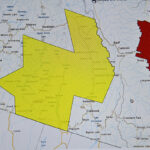Home »

Candidate calls for National Reconciliation Day
Kootenay-Columbia Green Party candidate Bill Green is calling for June 2 to be established as an annual National Reconciliation Day, after the release of the Truth and Reconciliation Commission (TRC) summary last week.
The report makes 94 recommendations, following six years of hearings and testimony from more than 6,000 residential school survivors and their loved ones.

“The TRC has not only brought forward the painful stories of residential school survivors; they have also provided Canadians and our governments and institutions with a tremendous opportunity to re-imagine and re-invent our country in a way which is respectful of the true founding peoples of this country: aboriginal people,” said Green. “In the words of the chair of the Commission, Justice Murray Sinclair: ‘Reconciliation is about forging and maintaining respectful relationships. There are no shortcuts.’”
Reconciliation is about establishing and maintaining a mutually respectful relationship between Aboriginal and non-Aboriginal peoples, the TRC explains. In order for that to happen, we must become aware of the past, acknowledge and make up for the harm that has been inflicted, and change our behaviour in the future.
Green has had the privilege of working for indigenous governments in Papua New Guinea and in British Columbia for almost 40 years. He says it has provided him with tremendous opportunities to learn about the profound differences between the cultures and perspectives of First Nations and those of non-native societies.
“I am most inspired by the TRC recommendations to fully adopt and implement the UN Declaration on the Rights of Indigenous Peoples,” says Green. “The Green Party is the only federal party that has committed to doing this.
“The TRC Calls to Action specify actions that should be taken by all governments, including aboriginal governments, and by businesses and sectors all across our society. Profoundly important recommendations are proposed with respect to education, both within the non-native education system and also for First Nations, Inuit and Metis systems,” said Green. “Establishing a National Council for Reconciliation – as recommended in the report – would help ensure that we continue this important work. The report also notes the important role of CBC/Radio-Canada in informing Canadians about reconciliation.”
The Ktunaxa Nation has fully endorsed the summary report of the TRC.
In a recent news release, KNC chair Kathryn Teneese said The Ktunaxa Nation is “hopeful that a report released this week can set out a new path of understanding, cooperation and healing between aboriginal and non-aboriginal Canadians. The recommendations made today by the Commission can support us on this path, but we need engagement from leadership at all levels of government across Canada and more importantly all Canadians, to ensure that these recommendations do not fall by the wayside. Reconciliation is not to forgive and forget but to remember so we do not repeat the mistakes of the past.”
Submitted







